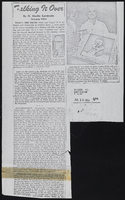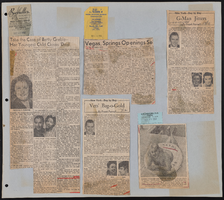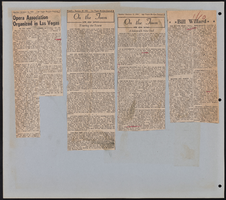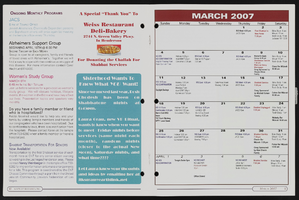Search the Special Collections and Archives Portal
Search Results

Transcript of interview with Alice Ward Boyer by Joanne Goodwin, June 26, 1996
Date
Archival Collection
Description
Alice Ward Boyer arrived in Las Vegas from Oklahoma in 1937. Her brother and former husband came earlier to escape the dustbowl depression and get settled. In the middle of the summer, just at dusk, she emerged from the train at Kingman, Arizona with her two small children to meet her family and drive through the darkness to her new home in Las Vegas. Although she missed the trees of the Plains, she soon became accustomed to her desert home. Her recollections revive the older Las Vegas when community life characterized the small town. At the heart of her story is the Mesquite Club. The non-partisan civic activities of the Mesquite Club are part of a national history of women’s club voluntarism in the nineteenth and twentieth century United States. Founded in 1911, this pioneer Las Vegas women's club played an essential role in the development of the growing town. When few cultural or social services existed, the club raised funds for the first public library, developed parks for the city, and provided services and funding for the aged and youth. The Mesquite Club, along with the Parent Teacher Association, scouts, and church activities formed a network of community relations commonly found in developing towns and cities, but not ususally associated with Las Vegas. Alice Boyer joined the Mesquite club in 1944. She first served as the chair of the Garden Committee, then "went right up through the chairs," and was elected President of the club for 1958-59. (See Table of Offices Held). Speaking about the Mesquite Club founders, Alice Boyer said, “They were very forward-looking women. They knew that the town would grow and they wanted the best for the town.” As one of the second generation of members, she has found the club to be a continuing source of congenial social life and civic community building. Born in rural Oklahoma, she spent her early years on a ranch. Her parents met there shortly after "the run to open Oklahoma" around 1892. They met, married and had twelve children, nine of which survived. Alice came right in the middle. She spent her early years riding horses, wearing “overalls," and spending as much time as possible outside. The family moved into Clinton, Oklahoma for better schools for their children when she was in the fifth grade. Alice graduated from high school just as the Great Depression began and worked briefly at a newspaper before marriage. At the time of the interview, Alice Boyer’s vivaciousness, gracious manner, and sharp memory belied her 82 years. This interview has been produced with the assistance of the Mesquite Club and the History Department of the University of Nevada, Las Vegas. It is part of a series on women community builders in Las Vegas. The transcript has been edited only slightly for clarity while the syntax and style of the narrator were retained.
Text

Transcript of interview with Alma Athella Huffman by R.A. Grau, March 2, 1972
Date
Archival Collection
Description
On March 2, 1972, collector R. A. Grau interviewed former Justice of the Peace, Alma Athella Huffman (born May 2nd, 1909 in Bunkerville, Nevada) in her daughter’s home in Las Vegas, Nevada. This interview covers the history of Southern Nevada. Alma also offers an in-depth description of early life in Bunkerville, Nevada.
Text
Frey, James H. (1941 June 29-)
James Frey was born in Eureka, South Dakota, in 1941. His father worked in creamery and his mother was a registered nurse. When Frey was nine, the family, including his twin sister, relocated in Sioux Falls where his dad was plant manager for a dairy. He joined the YMCA in the fourth grade and ended up working for them until around the age of 22. He attended Augustana College in Sioux Falls, graduating with a major in sociology and a minor in history. After graduation, he worked for three years at the YMCA in Sioux Falls as program director.
Person

Transcript of interview with Harriet Trudell by Caryll Batt Dziedziak, May 3, 2006
Date
Archival Collection
Description
Born on August 22, 1935, Harriet spent her childhood years in the segregated southern cities of St. Petersburg, Florida and Mobile, Alabama. Daughter to a blue collar plumber, who was also a union organizer and ‘rabid Democrat,’ Harriet recalls her father saying, “Remember children, you know what meat tastes like because there’s a man named Franklin Roosevelt.” Unsurprisingly, she grew up thinking Roosevelt was God. With her mother’s sudden death at age thirty-one from a cerebral hemorrhage, ten year old Harriet spent two years at a boarding school before rejoining her younger brother at her maternal grandparents in St. Petersburg. Florida. During this time, her father also based out of the grandparents’ home while following big construction work opportunities at various cities. In 1948, sixteen-year-old Harriet accompanied her father, an Alabama Delegate, to the Democratic National Convention. Hearing Hubert Humphrey’s Civil Rights speech change her life. “I came home from that conve
Text
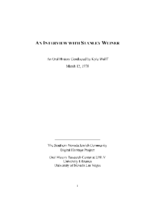
Transcript of interview with Stanley Weiner by Kyle Wolff, March 12, 1978
Date
Archival Collection
Description
Interview with Stanley Weiner by Kyle Wolff on March 12, 1978. In this interview, Weiner begins by talking about his father's employment, and then his own series of jobs, including as a department manager at Sears. He discusses living in different parts of town, population growth, educational opportunities, transportation, and recreation. The interviewer asks specific questions about sports, hotels, unions, and the weather.
Text

